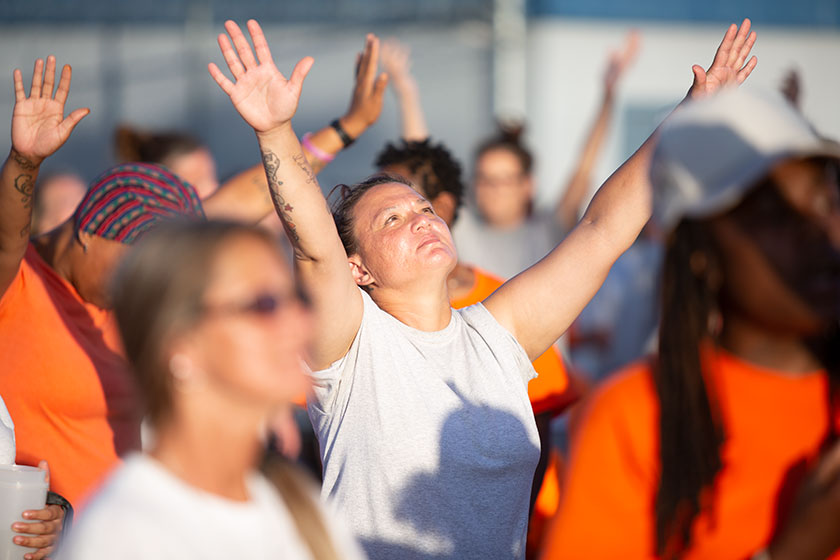We expect prisoners to be rehabilitated. But can they be restored?

Prison leaders face a difficult challenge. In addition to maintaining the security of all staff and prisoners within the facility, they must also promote rehabilitation behind the walls. But with the national recidivism rate at 68%, is change really possible?
RESTORATION AND REHABILITATION: THE DIFFERENCE
Prison Fellowship® begins with the belief that every person has God-given value and the capacity to change. Anchored in this truth, the Prison Fellowship Academy® takes cohorts of incarcerated men and women nationwide through a journey of holistic life transformation, usually spanning 12 months. More than a program, the Academy is a community. In this intentional, Gospel-centered community, prisoners have a safe place to practice healthy life skills and good citizenship behind bars and back in society, should they be released.
The Academy highlights six core values to guide prisoners back to the path God has for them:
- Community
- Affirmation
- Restoration
The terms "restoration" and "rehabilitation" are often used interchangeably. In the Academy community, rehabilitation generally occurs in the context of a person’s addiction recovery. The change is individual, and it is a vital part of the journey.
The Academy generally defines restoration as seeking and promoting reconciliation. In this context, restoration is relational. Participants learn to establish and maintain healthy relationships with one another, examine their roles and responsibilities as members of a community, and better understand how to control their emotions in daily life.
RESTORING RELATIONSHIPS
Alona recently graduated from Oklahoma's first women’s Academy at Kate Barnard Correctional Center. During her participation, Alona and her classmates lived in close quarters, learned to open up about their struggles, and took ownership of their transformation together.
But personalities didn't always mesh, and trusting relationships didn't form automatically. For many women in the program, the toughest part of the curriculum was conflict resolution. Instead of seeking deeper understanding and handling conflict directly, women in the community had an early tendency to make assumptions about others' motives and talk behind one another’s backs.
For Alona, restoring relationships with her classmates would call for "moments of truth"—hard and honest conversations:
Once we discussed how we were really feeling … I just realized how my attitude, my posture, the way I spoke to people, everything, affected other people. [I became] more aware of the way I talk to people, and the way I jump to conclusions."
"This was their struggle, and they would have to figure out the solutions for themselves," says Academy Manager Tammy Franklin. She and the volunteers gave the women tools to help them resolve their relational problems … but would they use them?
ON RECONCILIATION
At Prison Fellowship, we believe that God can restore any person or situation. But we understand that reconciliation is a deeply personal journey and decision that cannot be rushed or forced, especially when it involves a victim and perpetrator. Although some victims of crime report great empowerment and personal benefit from mediation with the person who wronged them, we must never assume that reconciliation can or should happen in every case.
Read more about engaging, supporting, and listening to victims of crime here.
"It was in the third quarter [of the program] when they really came together," says Tammy. Once they got started, she was taken aback at the ladies' dedication to putting their values into practice. "They began to truly care for one another, standing up for each other, encouraging one another. After all the conflict I was so amazed and relieved. … It was beautiful."
As transformation took place in each woman individually, their commitment to the hard work of restoration bore fruit. The cohort moved from tension and division to solidarity and true fellowship. In the process, they developed relational skills to carry through the rest of their lives, whether in prison or out.
GOD IS IN THE BUSINESS OF RESTORATION
God has been in the business of restoration since the beginning of time. Every person is made in the image of God, and no matter what they've been through, or what they've done, it’s a victory when any person is returned to beauty, wholeness, and life.
For more than 40 years, Prison Fellowship has embraced a vision of restoration—an emphasis on not just treating some symptoms of men and women behind bars, but repairing what has been fundamentally broken for so long.
The Academy emphasizes lasting restoration of the whole person—including spiritually and relationally.
And when the broken pieces are made new, we can't help but say, "Yes, that's how it was supposed to be, all along."
BACK TO BASICS
This blog series highlights the six core values of the Prison Fellowship Academy, an intensive, voluntary in-prison program founded on Christian principles of character and relational development. The Academy builds prosocial communities, provides healthy interactions with caring staff or volunteers, and creates safe opportunities for participants to integrate new values into their daily lives and take ownership of their transformation.
To read more from this series, click here.
DID YOU ENJOY THIS ARTICLE?
Make sure you don' t miss out on any of our helpful articles and incredible transformation stories! Sign up to receive our weekly newsletter, and you' ll get great content delivered directly to your inbox.
Your privacy is safe with us. We will never sell, trade, or share your personal information.